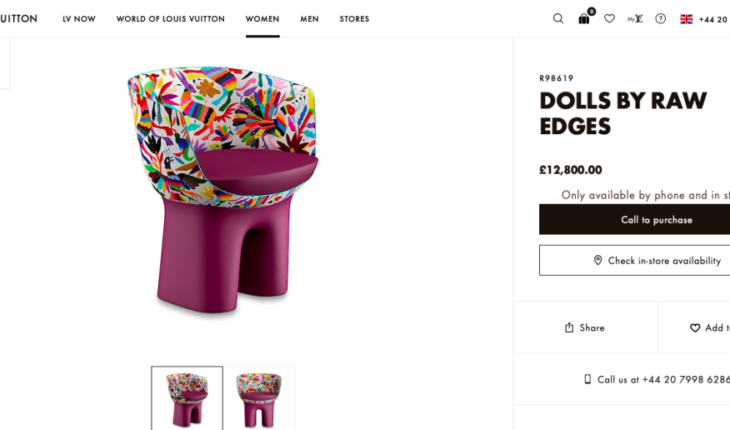The Mexican government sent a letter to french luxury brand Louis Vuitton questioning it for using colorful indigenous designs from the center of the country to craft the lining of an expensive armchair.
“We have learned with surprise that in your signature Dolls by Raw Edges collection, a chair (model R98619) is featured in which elements that are part and are identified with the embroidery that are made and are the intellectual property of the Tenango d community (e) Doria,” says a letter from the Mexican Culture Secretariat.
The missive, dated July 5 and signed by the holder of the portfolio, Alejandra Fausto, emphasizes: “We feel obliged to consult them, in a respectful way, if for the elaboration of the chair (…) they sought and in their case had the collaboration of the community and that of their artisans.”
Read: ‘Get rich with our work’: Mexican artisans claim that brands copy their designs
Louis Vuitton’s website offers the armchairs of the Dolls by Raw Edges series for $12,800. Among them is a design whose backing shows typical motifs -multicolored animals- of the Otomí ethnic it, whose communities live in Tenango de Doria, in the central state of Hidalgo.
“Each piece of craftsmanship is unique and unrepeatable and is, at the same time, the result of the continuity of the work of many generations that transmit knowledge, dexterity, and above all creativity”, explains the Secretary of Culture, alluding to the “vast cultural, tangible and intangible heritage”, of Mexico.
The Mexican government invited the French firm to participate in “a working table” together with indigenous communities to achieve “direct and concrete benefits for all parties” and to “give due recognition of the community in which the cultural appropriation.”
You may be interested: Michael Kors jargon and other muuuy designs similar to Mexican artisans’ garments
Recently, Mexico accused the American firm Carolina Herrera of cultural appropriation for resuming patterns from three indigenous communities.
The brand’s creative director, Wes Gordon, defended himself by saying that he “pays homage to the richness of Mexican culture” and recognizes “the wonderful and diverse craftsmanship” of the country.
More on the subject: The lack of copyright registration of indigenous embroidery allows large brands to plagiarise their designs
Zara, Mango, Isabel Marant, and Rhapsody are other brands that have been noted to “appropriate” the designs of the indigenous peoples of Mexico.
These marks did not give the brocades credit to the communities, nor did they work with the craftsmen, they only took their designs and reproduced them in their garments.
What we do in Animal Político requires professional journalists, teamwork, dialogue with readers and something very important: independence. You can help us keep going. Be part of the team.
Subscribe to Animal Politician, receive benefits and support free journalism.#YoSoyAnimal
translated from Spanish: Mexico questions Louis Vuitton by design with Otomi embroidery
July 9, 2019 |





